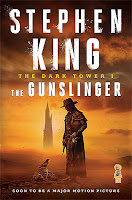"I really have no idea what any of this is about, so you'll be getting "straight from the gut" reactions here. So far, the book is a Russian nested doll and if I'm tracking things correctly, I've just read a story within a story within a dream. Is this Inception? Does time flow backward? Is the whole book going to be like this?"
So we are just going to move ahead to the finished book post and you can carry that confused snapshot with you throughout the rest of this.
It only took me until now to finally read a Dark Tower book! Stephen King frequently states that he regards this series as one giant book. The rest of the volumes are way bigger than this one, so there is much work to be done. Some of the reviews I've read about this, the opening "chapter" of the megabook, is that we should not judge it too harshly. It is different than everything that comes after it. For one thing, it is actually five short stories, with at least the first one long enough to qualify as a novella. These stories were all previously published in somewhat altered forms in the Magazine of Fantasy & Science Fiction in the late 1970's and early 1980's. I can only imagine what any reader that missed the previous installments was thinking reading these stories back then. Also, from what I can tell, King himself cleaned up the original version of this book to make things a little more consistent. It wasn't done to Stand-like proportions, so I'm not too worried about what changed. However, I was a little surprised to find out that the five stories do not differ substantially from how they appeared in F&SF, meaning the we aren't flashing back into the story proper; the original story treats it as a flashback as well. There is essentially no added connective tissue for the sake of making the book flow. This is to say the book does flow in spite of five different publications. Better for the book readers like me than the magazine readers, I suppose.
 Going into this, I knew pretty much zilch about the Dark Tower. Although, thanks to hearing a few things on a podcast and seeing a movie trailer well before approaching this book, I sort of knew what was going on here. For the uninitiated, this book literally drops the reader in the middle of nowhere. I'm not misusing the word "literally". It is the middle and it is nowhere. As I wrote it my halfhearted progress report, the first story, the novella "The Gunslinger" is something like three flashbacks nested in one another. Although it shows a writer like King flashing some mad skillz, it is quite confusing. On the other hand, it does get us out of the middle of nowhere, as I don't think anybody needed or wanted 90 pages of chases in a total desert.
Going into this, I knew pretty much zilch about the Dark Tower. Although, thanks to hearing a few things on a podcast and seeing a movie trailer well before approaching this book, I sort of knew what was going on here. For the uninitiated, this book literally drops the reader in the middle of nowhere. I'm not misusing the word "literally". It is the middle and it is nowhere. As I wrote it my halfhearted progress report, the first story, the novella "The Gunslinger" is something like three flashbacks nested in one another. Although it shows a writer like King flashing some mad skillz, it is quite confusing. On the other hand, it does get us out of the middle of nowhere, as I don't think anybody needed or wanted 90 pages of chases in a total desert.Two other stories, "The Way Station" and "The Slow Mutants", also turn on flashbacks. The non-flashback content, as the titles appear to indicate, is a bit ho-hum. The flashbacks, about Jake's previous life in New York City and Roland's in a fantasy novel respectively, are the meat of the story. If you don't care for flashbacks, "The Oracle and the Mountains" and "The Gunslinger and the Dark Man" stick to the present and reward readers who wondered what the big deal was with a magic jawbone. The present day stuff is a good deal more confusing than the flashbacks. For one thing, NYC is familiar territory for most, even if you've never been there. Roland's story is pretty much boilerplate fantasy. The scenes in the present make the reader wonder what the hell this "middle world" is. Did it used to be normal and turned weird? How does anyone get here. The point where Jake is sacrificed while they are traveling inside a mountain in the penultimate story nearly broke my brain. Was this some kind of subway station and our present is their distant past? How does a bridge get inside a tunnel? Are they in Wario's gold mine?!
Hopefully I'm not the only reader who walked away from all of this with more questions that answers, but I'm giving the book a wide berth. It needed a lot of tweaking (but not a full overhaul) from its original published form. It also never intends to stop at a satisfying point, as the next six books appear to indicate. Since it's one big book, the story will simply carry forward in the opening pages of The Drawing of the Three, published five years later. Therefore, I will not think of a witty closing line to this post, but rather just continue where I've left off here.


No comments:
Post a Comment